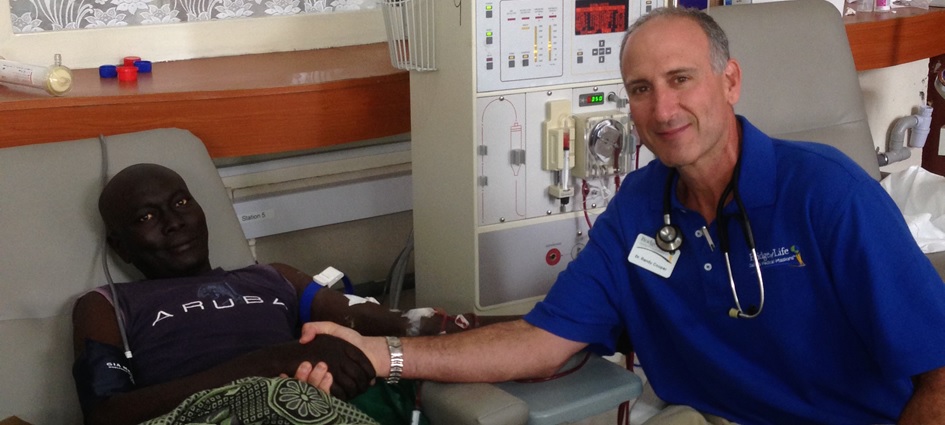Randy Cooper
Donor Since: 2009

1. How long have you been a Bridge of Life supporter?
I began sponsoring Bridge of Life (BOL) around 2009 when I supported a teammate who was participating in Tour DaVita, an annual cycling event that raises funds for BOL. I didn’t know a lot about BOL at the time. My interest in the organization and my desire to help grew from there.
2. What made you first decide to contribute financially to BOL?
I can distinctly remember attending a Night of Honor event when my group was considering partnering with DaVita. I saw an amazing video about BOL’s work, and I knew immediately that I wanted to be a part of the work they were doing. Because I am a nephrologist, BOL’s mission aligns well with the work that I do everyday. I understand it, it’s in my “wheelhouse,” and I can contribute in a meaningful way. So I reached out to the executive director of the organization to share my interest.
3. Please describe your volunteer experience(s) with BOL.
In 2012, Lori Vaclavik, BOL’s executive director, called me and asked if I would consider participating in a BOL medical mission to Kenya. I was ecstatic! My first mission trip took place early in 2013. Our mission was challenging: the dialysis unit was ready to open but there were several in-country regulatory steps which delayed the opening. We were able to complete staff training while we were there and had the opportunity to meet with several officials within the Kenyan Health Ministry to get the mission back on track as well as to promote BOL. My second trip was in July 2013 to open the new clinic, which was in a small town about three hours north of Nairobi, Kenya. To experience the gratitude of patients as well as clinic staff was humbling. They were so happy to see us again after six months and to know that we were committed to the long-term sustainability of their clinic. I also participated in a BOL surgical mission in Jamaica last October where the team performed surgery in three different areas of the country and created 63 new AV fistulas. I think it’s safe to say that I am hooked and will continue to volunteer and support this important work. My wife has also been able to participate in some of these missions. For us, being a part of BOL allows us to perform the act of Tikkun Olam, a Hebrew phrase describing our shared responsibility to repair the world. Each one of our missions allows us to repair just a little bit more.
4. Why do you continue to support BOL’s work?
There are a lot of reasons why I support BOL – both financially and by contributing my time and skills. Simply put, BOL provides me with a meaningful and worthwhile way to give back and to help those who are less fortunate. It allows me to contribute my expertise to make a difference. My medical practice was able to donate 20 dialysis machines to BOL to support its medical missions, which was very gratifying. I’m also at a point in my life, now that my children are grown, where I can utilize my time in ways I haven’t before. BOL serves as a good moral compass for me to help remember why I went into medicine to begin with. It’s exciting to be a part of an effort that is changing lives.
5. If you were speaking to a prospective donor, what would you consider the most important information to share about BOL and its work?
I want prospective donors – and current donors – to understand the significant impact that BOL is having. The need for healthcare in many developing countries is significant, and often times patients receive dialysis not when they need it, but when they can afford it, and in many cases they don’t receive enough treatments or timely treatments. I would strongly suggest that donors support BOL in any ways that they can – through time, financial resources, equipment donations, or connections. I’m a big supporter of participating in the mission trips too. It’s so important to touch, feel and see what you’re a part of and how you’re making a difference.
6. What do you hope BOL is able to accomplish in the upcoming year or two with your continued investment and support?
We’re fortunate in the United States to be a part of a medical system where, while it may have its flaws, our government provides medical support to our citizens through Medicare and Medicaid. I spoke to a patient in Kenya who was an ex-university professor who shared that the challenges they face are not just access to technology, but the ability to pay for, distribute and sustain technology. I’d like to see BOL focus not just on how we can build more clinics, provide more dialysis machines to existing clinics and more patient and DaVita teammate education, but on how we might help the local health ministries and governments build sustainable healthcare systems.